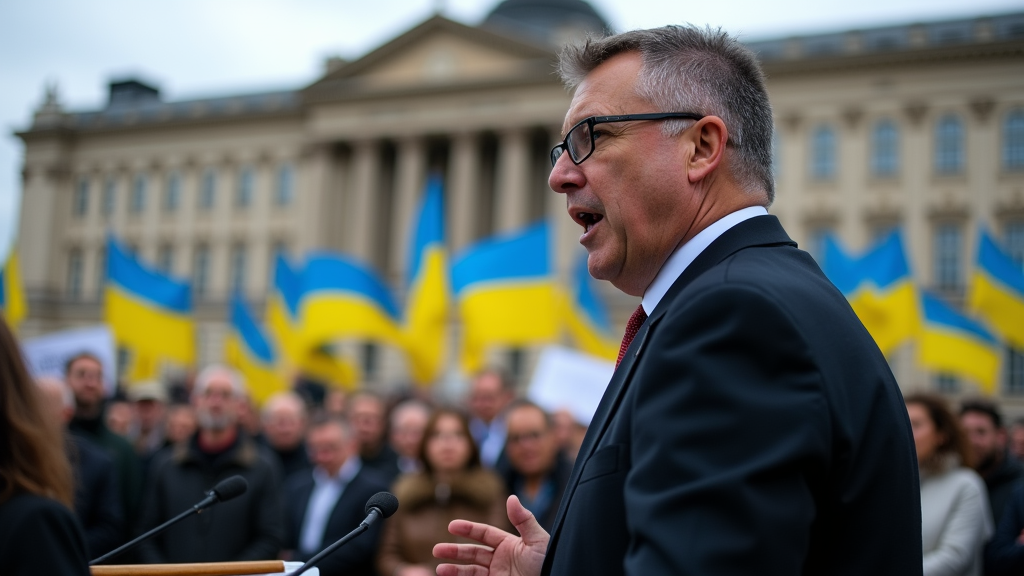Defending Ukraine: Boris Pistorius Challenges US Peace Proposals
Boris Pistorius’s Bold Stand Against US Peace Proposals
In the unforgiving theater of war, where lives hang in the balance and futures teeter on the edge of uncertainty, one voice has emerged as an unwavering pillar—Boris Pistorius, Germany’s Defense Minister. His recent sharp criticism directed at America’s so-called ‘peace proposals’ regarding the ongoing Russian-Ukrainian conflict has reverberated throughout diplomatic corridors and echo chambers, igniting a fervor of debate that is far from over.
The US Proposals Under Fire
Pistorius’s intense scrutiny isn’t simply rhetoric; it’s a testament to his fierce belief in Ukraine’s sovereignty. As the stakes rise higher, what precisely does the American plan entail? His allegations unveil a disturbing picture:
- An official recognition of Crimea as Russian territory.
- De facto concessions of portions from Donetsk, Luhansk, Kherson, and Zaporizhia regions.
- A proposed ceasefire that comes without the promise of safety for Ukraine’s borders.
“These demands go too far,” Pistorius lamented. “They represent nothing less than a capitulation.” Yet, on the surface, such claims can seem abstract—far removed from the visceral reality faced by those on the ground.
Imagine for a moment a young Ukrainian mother, clutching her child tightly as the sounds of distant artillery punctuate their day-to-day lives. Would acceptance of these terms feel like surrender? Would a handshake over territorial loss echo in the hearts of generations scarred by conflict? The implications pulse beneath the surface, a stark reminder of what it means to concede—even under the guise of peace.
A Sovereign Nation’s Fight
Pistorius emphasizes that Ukraine already had the capacity to capitulate before the US involvement. His words pierce through the fog of war: “Ukraine could have reached this outcome on its own almost a year ago.” Yet, every individual understands the weight of choice. The air thickens with urgency; the war is not merely a matter of territories but a fight for identity and freedom.
Envision Ukrainian citizens crowding outside government buildings, rallying for their sovereignty, painting their dreams in the colors of a flag they refuse to abandon. Each chant, each placard, echoes their resolve—captured in an anthem sung not just by them, but by the world at large, standing in solidarity against oppression. This is not merely political jargon; this is the raw pulse of a nation.
Germany’s Stance as a Beacon of Support
In an environment fraught with uncertainty, Pistorius assures that Germany will remain steadfast in its support. “We will continue our military aid to Ukraine even if the US halts its assistance,” he asserts. These words carry weight, laden with the promise of collective resolve against a backdrop of wavering alliances. It serves as a rallying cry for Europe, a collective heart beating against complacency.
Yet, as he articulates Germany’s steadfast position, we cannot overlook the contrasting echoes from a previous era. Under Trump’s administration, the atmosphere was one of threats and ultimatums, a chess game with human lives at stake. An exit from negotiations loomed ominously, leaving allies questioning the foundation of their partnerships. Today, Pistorius charts a different course—one not fortified by intimidation, but by unwavering commitment.
As the flames of conflict flicker on the horizon, the fragility of peace hangs precariously, teetering on a knife’s edge. The dialogue created around these proposals isn’t just a discussion of borders or ceasefires but embodies a much deeper struggle—a struggle for dignity, respect, and the very right to exist within one’s own skin.
Each ink-stained page of this ongoing narrative becomes a testament to sacrifice and hope, reflecting a glimmer of what it means to stand resilient in the face of overwhelming odds. The world watches as history unfolds, and we must ponder: what sacrifices will the future demand, and at what cost do we seek peace?
The Dangers of Compromise
As the shadow of war looms larger, the danger of compromise becomes starkly apparent. Pistorius’s warning resonates not only within the halls of power but on the very streets of Ukraine. Every inch of land is more than mere geography; it is a fragment of identity, a piece of history that bears witness to the struggles of countless souls. When peace is offered at the price of territory, the question arises: who benefits most?
Imagine a soldier standing guard over a hilltop, the distant city skyline visible under a golden sunset. What thoughts whirl through his mind? The weight of his duty to protect is heavy, the memory of brothers lost in battle a haunting presence. Would a peace agreement that demands surrender echo in his heart as the ultimate betrayal? Such reflections are crucial, as they underscore the human element overshadowed by political machinations.
The Impact on International Diplomacy
Pistorius’s remarks on the US proposals highlight a dangerous precedent. The respect for international sovereignty, once a bedrock principle, stands on shakier ground as traditional alliances face turbulent transformations. Recently, the German Defense Minister emphasized how “the principles of respect for Ukraine’s sovereignty must remain non-negotiable,” a sentiment that reverberates among those who understand the intricate web of relationships that underpins global peace.
European allies are concerned; they fear that these proposals could embolden not just Russia but other aggressive entities around the world. The idea of conceding territory represents not just a diplomatic failure but a potential shift in the balance of power. Each concession could send ripples through the international community, altering perceptions and emboldening autocrats. How do we ensure that the sacrifices made today do not lay the groundwork for conflict tomorrow?
The stark image of Ukraine’s landscape, dotted with signs of devastation yet strewn with the resilience exhibited by its citizens, is a reminder that the stakes are immeasurable. Each home bombed, each family displaced adds to the tapestry of grief and hope—a stark juxtaposition of humanity amidst the chaos.
Future Prospects and the Path Forward
What lies ahead as the debate intensifies? Ponder the voices of those affected: a farmer in western Ukraine watching his fields turn to dust, a child fearing the permanence of silence where laughter once resided. Their perspectives illuminate the urgency of finding solutions that prioritize dignity over capitulation.
Pistorius’s declaration is not just a rallying cry; it stands as a promise—a commitment that Germany will not abandon its partner in this existential struggle. Yet, the specter of indecision looms, as global leaders often juggle nuanced interests while lives hang in the balance. How fragile is the concept of unity when faced with the stark realities of war?
To navigate these waters, leaders must grapple with the ethical implications of their decisions. With the geopolitical landscape shifting, what will it require for nations to rise above self-interest and advocate for true justice? Each discourse, each diplomatic effort, must aim for a balance that honors both sovereignty and the sacrosanct right to exist.
Let these reflections serve as a demand for action, a collective plea to remember: peace cannot come at the cost of dignity, nor should it eclipse the scars borne by those who fight.
As we collectively chart the path forward, standing with Ukraine means empowering those who refuse to accept a future dictated by conquest. The resolve demonstrated by leaders like Pistorius inspires, illuminating a beacon of hope amidst darkness. Yet, the question remains—will the world listen, or will silence fall once more?
Want to stay up to date with the latest news? Subscribe to our Telegram channel: Завжди свіжі новини.
For further insights, visit Newsmagazine.”https://www.pravda.com.ua/news/
latest video
news via inbox
Subscribe to the latest news in the world of politics and technology







